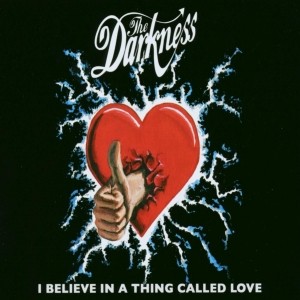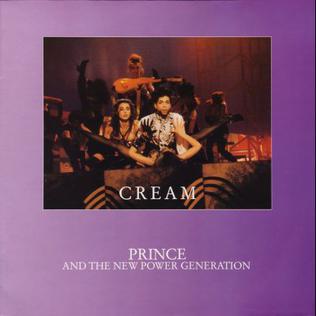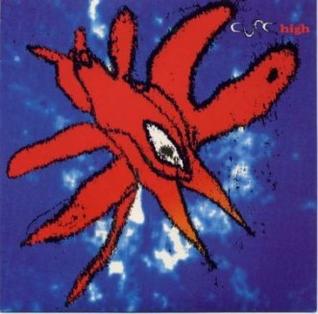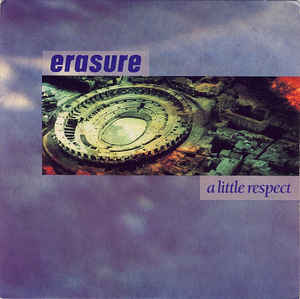EMF are an English alternative rock band from Cinderford, Gloucestershire, who came to prominence at the beginning of the 1990s. During their initial eight-year run, from 1989 to 1997, the band released three studio albums before a hiatus. Their first single, "Unbelievable", reached number 3 on the UK Singles Chart, and was a number 1 hit on the US Billboard Hot 100 chart. Their debut album, Schubert Dip, went to number 3 on the UK Albums Chart. In April 2022, EMF released their first album of new material in 27 years, Go Go Sapiens.

"Knockin' on Heaven's Door" is a song by American singer-songwriter Bob Dylan, written for the soundtrack of the 1973 film Pat Garrett and Billy the Kid. Released as a single two months after the film's premiere, it became a worldwide hit, reaching the Top 10 in several countries. The song became one of Dylan's most popular and most covered post-1960s compositions, spawning covers from Eric Clapton, Guns N' Roses, Randy Crawford, and more.

The discography of the Irish rock band U2 consists of 15 studio albums, one live album, three compilation albums, 84 singles, and nine extended plays (EPs). The band formed at Mount Temple Comprehensive School in 1976 as teenagers. In 1979, the group issued their first release, the EP U2-3, which sold well in Ireland. The following year, the group signed to Island Records and released their debut album, Boy. It reached number 52 in the UK and number 63 in the US. They followed it up with the release of October (1981) and War (1983). War was a commercial success, becoming the band's first number-one album in the UK while reaching number 12 in the US. The album yielded the singles "Two Hearts Beat As One", "Sunday Bloody Sunday" and "New Year's Day", the latter two have since become among the band's most popular songs. On the subsequent War Tour, the group recorded the live album Under a Blood Red Sky and concert film U2 Live at Red Rocks, both of which sold well and helped establish them globally as a live act.

Abba-esque is an extended play (EP) by English synth-pop duo Erasure. Released on 1 June 1992, the EP was Erasure's first and only number one on the UK Singles Chart and also became a number-one hit in Austria, Denmark, Finland, Greece, Ireland, and Sweden.

"I Believe in a Thing Called Love" is a song by English rock band the Darkness, released as the third single from their debut studio album, Permission to Land. When released as a single in September 2003, it peaked at number two on the UK Singles Chart. The song also charted worldwide, becoming a top-10 hit in Ireland, New Zealand, and Sweden, as well as on the US Billboard Modern Rock Tracks chart.

"Cream" is a song by American singer-songwriter Prince and his backing band the New Power Generation, released in September 1991 as the second single from Prince's 13th studio album, Diamonds and Pearls (1991). In a 2004 MTV special, Prince joked that he wrote the song while looking at himself in the mirror. "Cream" became Prince's fifth and last number-one single on the US Billboard Hot 100, staying at the top for two weeks. The song entered the top 10 in 15 other countries worldwide, peaking within the top three in Australia, Canada, Norway, and Switzerland. Its music video was directed by Rebecca Blake.

"Get Ready for This" is a song recorded by Belgian/Dutch music group 2 Unlimited. It was released in 1991 as the lead single from their debut album, Get Ready! (1992). Originally, the single was produced as an instrumental, titled the "Orchestral Mix". It became a hit and conscious of their popularity, Wilde & De Coster wanted a more accessible, formatted formula for their project to grow. Ray was then asked to write lyrics and add a rap to the track. On Ray Slijngaard's suggestion, Anita Doth joined as the female vocalist.

"High" is a song by English rock band the Cure, released as the lead single from their ninth album Wish on 16 March 1992. The track received mostly positive reviews and was commercially successful, reaching number one on the US Billboard Modern Rock Tracks chart, number six on the Irish Singles Chart, and number eight on the UK Singles Chart. It charted within the top five in Portugal, where it peaked at number two, and in Australasia, reaching number five in Australia and number four in New Zealand; it is the band's highest-charting single in both countries.

The discography of Nirvana, an American rock band, consists of three studio albums, twenty-one singles, five live albums, two extended plays, four compilation albums, and three box sets.

"Please Don't Go" is a song written by Harry Wayne Casey and Richard Finch, then members of KC and the Sunshine Band, and released as the second single from the band's sixth album, Do You Wanna Go Party (1979). Cover versions of the song that reached the top songs charts were recorded by Double You (1992), KWS (1992), and Basshunter (2008).

"A Little Respect" is a song written and recorded by English synth-pop duo Erasure, released in September 1988 by Mute. It was written by Vince Clarke and Andy Bell. The lyrics are a plea to a lover to show compassion and respect. The heavily synthesized instrumentation is accentuated by acoustic guitar and Bell's vocal falsetto in the chorus. It was their tenth single and was taken from their third studio album, The Innocents (1988). Known as one of their signature songs, the single reached number four on the UK Singles Chart and was Erasure's second consecutive top-20 hit on the US Billboard Hot 100, where it made number 14, and reached number two on the US Hot Dance Club Songs chart.

"Unbelievable" is a song written and recorded by British band EMF, originally appearing on their debut album, Schubert Dip (1991). It was released as a single in the UK in October 1990, peaking at number three on the UK Singles Chart on 1 December 1990. It was the 32nd-best-selling single of 1990 in the UK, and a top 10 hit also in Belgium, Germany, Ireland, the Netherlands, Norway, Spain and Sweden. In the United States, it hit number one on the Billboard Hot 100 in 1991. The song was produced by Ralph Jezzard, and contains samples of US comedian Andrew Dice Clay and a Black Panther Party member shouting "What the fuck?"

"Sleeping Satellite" is a song by British singer-songwriter Tasmin Archer, released in September 1992 as the first single from her debut album, Great Expectations (1992). Co-written by Archer, the song received favorable reviews from music critics and became an international hit. It peaked at number one in the United Kingdom, Greece, Ireland, and Israel and reached the top 20 in 13 other countries as well as number 32 on the US Billboard Hot 100 in June 1993. There were produced two different music videos to promote the single.

"Can We Fix It?" is the name of the theme song from the British preschool animated television programme Bob the Builder. It was written by Paul K. Joyce and produced by Hot Animation. The song's title is derived from the catchphrase of the programme's titular character, and the chorus of the song features this phrase prominently, as well as the response, "Yes we can!" Vocals on the song are provided by Neil Morrissey, who voiced Bob at the time of the track's recording. It was released as a single on 4 December 2000 in the United Kingdom.

"Rapture" (sometimes referenced as "Rapture (Tastes So Sweet)") is a song by American recording duo iiO. It was chosen as the lead single from their debut studio album, Poetica (2005). The song was written by both the members; Nadia Ali and Markus Moser, while production was handled just by Moser. The song was released in the United Kingdom on October 29, 2001, by Data Records and was released in the United States via Universal Records in January 2002.

"I Believe" is a song by British band EMF, released as the second single from their first album, Schubert Dip (1991). The song was released as a single in January 1991 in the UK following their big hit "Unbelievable". The song reached number six on the UK Singles Chart. In the US, the song was the band's third single, reaching number 10 on the US Billboard Modern Rock Tracks chart. The accompanying music video received heavy rotation on MTV Europe.

"Black and Gold" is the lead single from Australian singer Sam Sparro' eponymous debut album. The song was written by Sparro and Jesse Rogg. It has been remixed by Max Sanna and Steve Pitron, Paul Epworth, Al Usher, Kings of the Universe, Kromatik and Russ Chimes. The original version of the single was made available online on 31 March 2008. On 7 April, the CD, 12-inch, and limited edition 7-inch singles were released.

English singer Sam Smith has released four studio albums, one independent album, three live albums, one remix album, one soundtrack, thirteen extended plays, thirty-seven singles, and six promotional singles.

"Shiny Disco Balls" is a song by Who Da Funk featuring Jessica Eve on vocals. The single was written and produced by Jorge Mario Jaramillo and co-produced by Alex Alicea. "Shiny Disco Balls" reached number 15 on the UK Singles Chart, number 9 in Greece, number 23 in Ireland, and number 24 in Australia. In addition, it topped the UK Dance Chart for two weeks and reached the top 30 on the US Dance Club Play chart.

American rapper Eminem has released 57 singles as a lead artist and nine promotional singles. He has also featured in 23 singles as a guest artist, while entering the charts with over 100 additional songs.



















